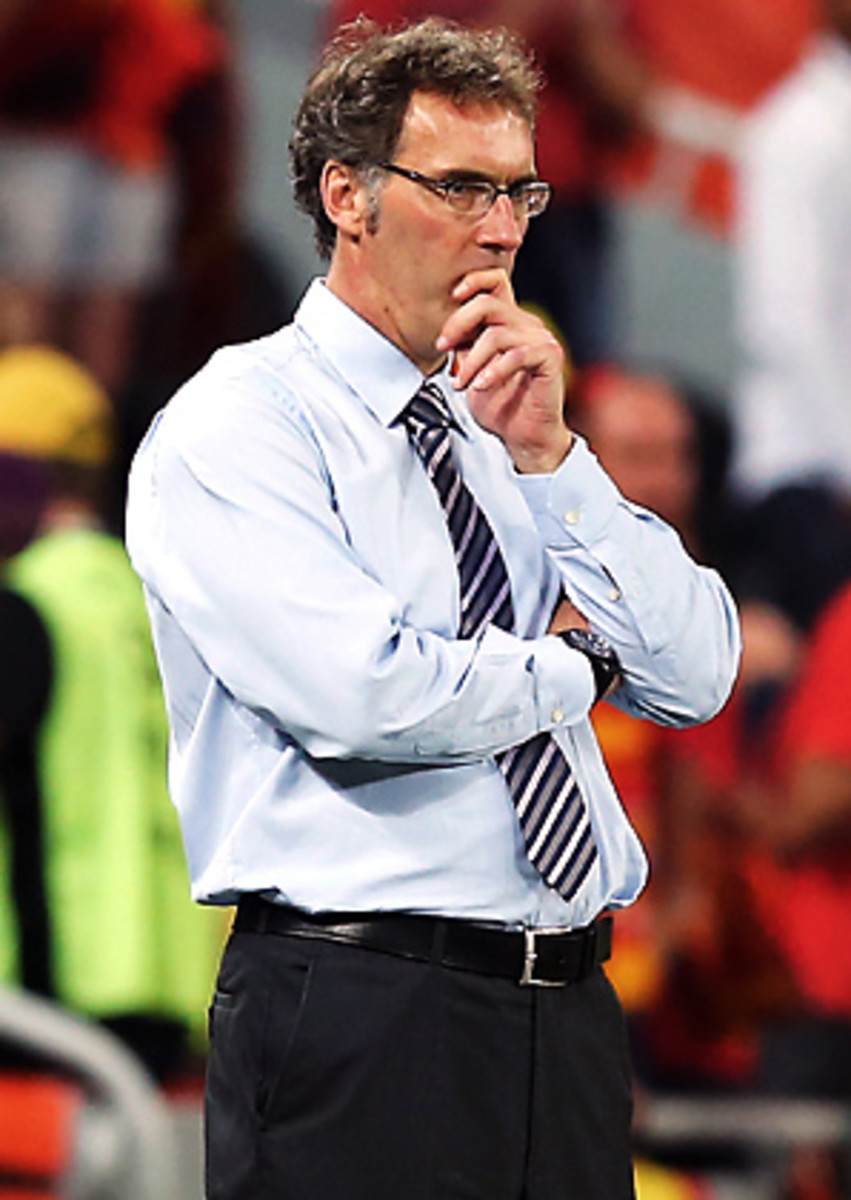Three thoughts on Spain-France
1. Laurent Blanc's tactical gamble backfired -- As a coach who spent a year playing for Barcelona -- he would often talk tactics with Jose Mourinho, then on the coaching staff, as well as teammates Pep Guardiola and Luis Figo -- Laurent Blanc has made no secret of his admiration for Spain's style of play. He talked of wanting France to play like the reigning champion, and was happy to pick technical players -- like Samir Nasri, Marvin Martin, Jeremy Menez and Mathieu Valbuena -- over physical ones; he wanted his defenders to start attacks and his forwards to play a fast-passing game.
Until this game, that is. This was Blanc's chance to show the world how far France had come in his two-year reign; and, after reports of (more) dressing-room bust-ups after the Group D loss to Sweden, to make the country proud of its team again. Instead, Blanc made three changes to his lineup, fielding what L'Equipe newspaper called "a hyper-defensive" team, with two right-backs, Anthony Reveillere and Mathieu Debuchy, picked to counter the threat of Andres Iniesta.
Within 20 minutes, the plan had failed: Iniesta threaded a pass to Jordi Alba, who skipped past a diving Debuchy, found enough space from Reveillere to cross for Xabi Alonso, on his 100th appearance for Spain, to head the opener in yards of space. Never mind the errors down France's right that created the cross: where was left-back Gael Clichy, midfielder Florent Malouda, or left-winger Franck Ribery? They were nowhere to be seen, and thereafter Spain's best attacks came from its right wing, mainly because Iniesta kept on popping up there.
It was strange to see France, second to Spain in possession stats for the tournament before this game, so starved of the ball: in the first half it had only 35 percent possession, and players like Yohan Cabaye, who pre-match was billed as "the Xavi of France" was totally bypassed. The second half was better, as Cabaye grew in influence, and when Menez and Nasri appeared with 25 minutes left, France had an eleven it might perhaps have started with.
"The game that Barcelona and Spain play, it's tiki-taka," said Javier Irureta, a Spanish coach who led Deportivo la Coruna to La Liga success in 2000. Tiki, I give; taka, I receive. But I get the sense there's not enough taka in the France team. There was no tiki either, and, a bit like Germany after the 2010 World Cup semifinal, Blanc will be left with huge regrets that he chose not to take on the reigning champion playing his team's natural game. Instead, France played a reactive game and it failed.
Where this leaves Blanc and his future is a debate that will surely follow. French FA president Noel Le Graet spoke of extending his contract if the tournament goes well, but has it? There is no shame in losing to Spain, but the manner of the loss, as well as the defeat to Sweden (which led to France playing Spain and not Italy), the behind-the-scenes problems in its aftermath, and question-marks of Blanc's use of substitutions throughout the tournament, means that his staying in charge is not a guarantee.
2. So much for Spain's quarterfinal struggles -- In the last two tournaments that Spain has won, its key match has been at this stage of the competition: at Euro 2008, it needed a penalty shootout to get past Italy after a 0-0 draw. Cesc Fabregas, then only 21, hit the winning spot-kick and, the Spanish players have since admitted that win helped overcome a huge psychological barrier. In 2010, against Paraguay, Spain conceded a goal that was wrongly ruled out for offside, before Iker Casillas saved a penalty from Oscar Cardozo. David Villa scored a late winner.
Against France, the team that inflicted Spain's last defeat at a major tournament -- the 2006 World Cup, in the quarterfinals, inspired by a Real Madrid player, Zinedine Zidane -- Spain withstood more pressure in the second half, but rarely looked troubled. This performance was a much more positive one than against Croatia in the final Group C match, which drew so much criticism from the Spanish media (yes, it was helped by that early goal and, you could argue, France's first-half tactics). But there can surely be fewer complaints this time around. This time it wasn't even 1-0, the score line by which Spain won all its World Cup knockout matches two years ago.
3. Ronaldo will prove a tougher test in the semifinal -- Spain's Real Madrid defenders were wary of the threat posed by their teammate Karim Benzema before this game. After all, he scored 32 goals for the Spanish champions last season. But Benzema had few chances against Spain, too often dropping deep to chase the ball and he leaves the tournament as the only big-name striker without a goal to his name. If Casillas, Ramos and Arbe loa were nervous about Benzema, how must they feel about facing Cristiano Ronaldo in the semifinal? Ronaldo scored 60 goals for Madrid, but more significantly, has looked like repeating that form in a Portugal shirt for the first time in his career. As well as hitting the post four times, his goals against Holland (two) and Czech Republic (one) have taken Portugal into the semifinal. Spain's moments of vulnerability have come when attacked at pace and the Madrid men won't relish the prospect of Ronaldo looking to burst their bubble. Benzema may have underperformed on the big stage tonight; but there's little chance Spain will be so fortunate that Ronaldo will do the same.





